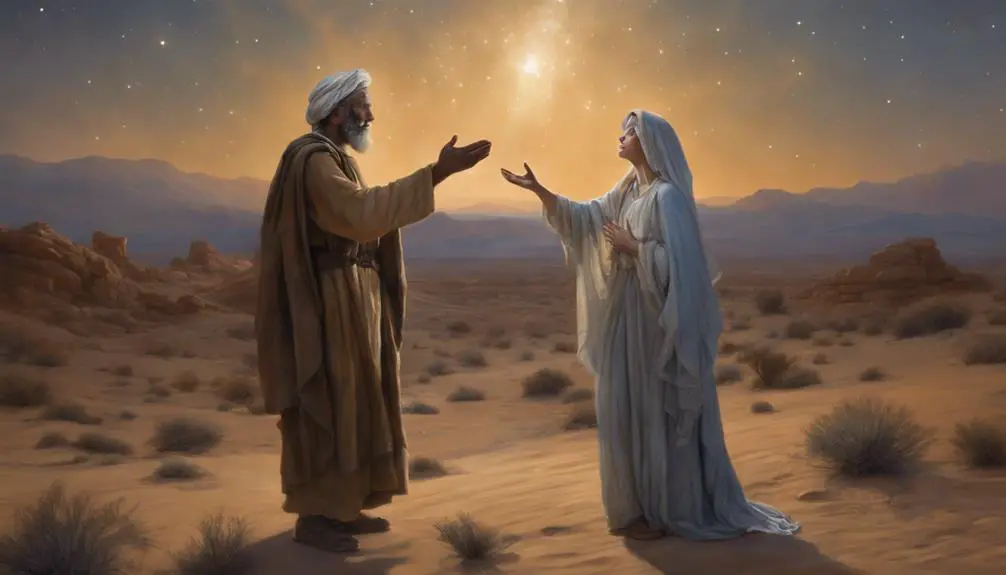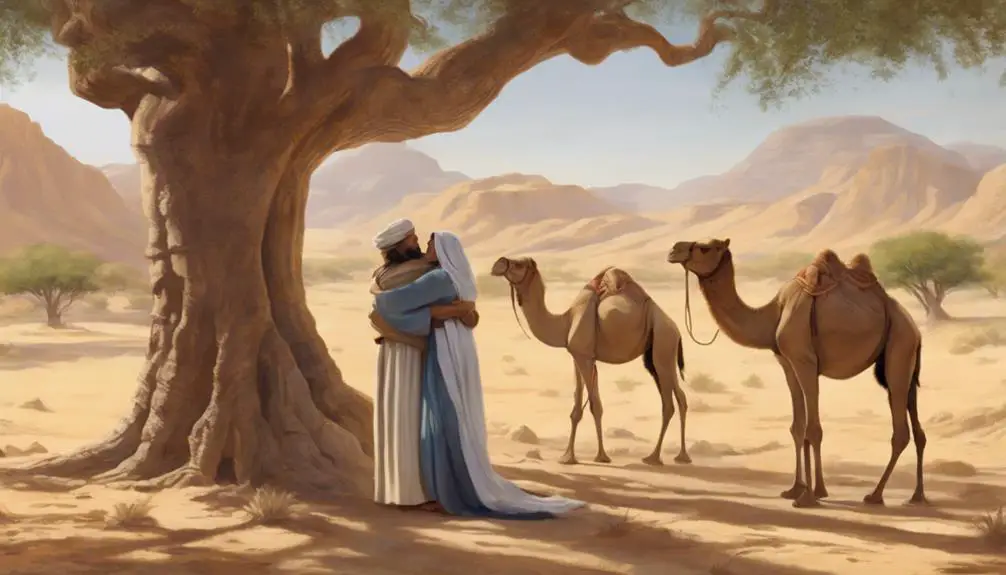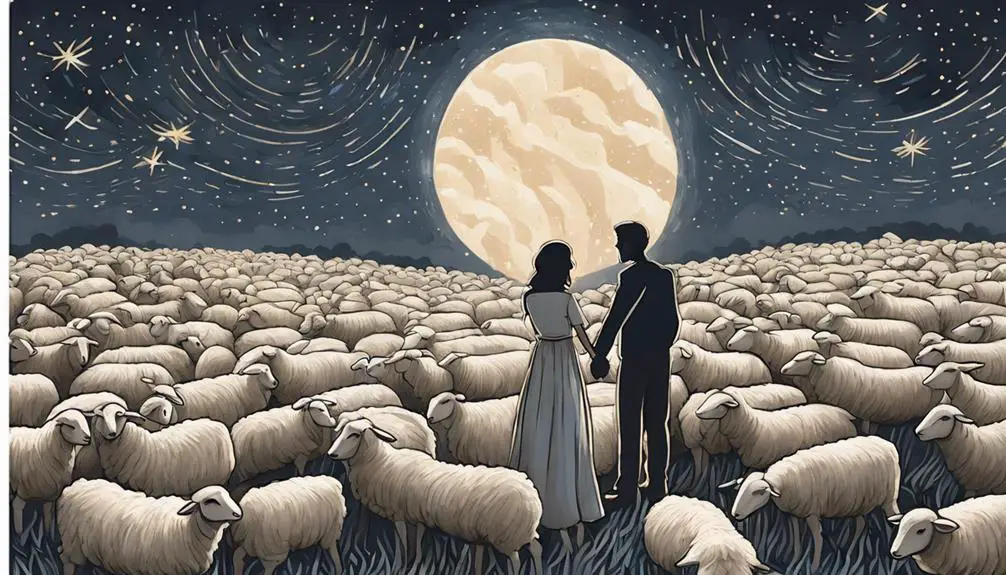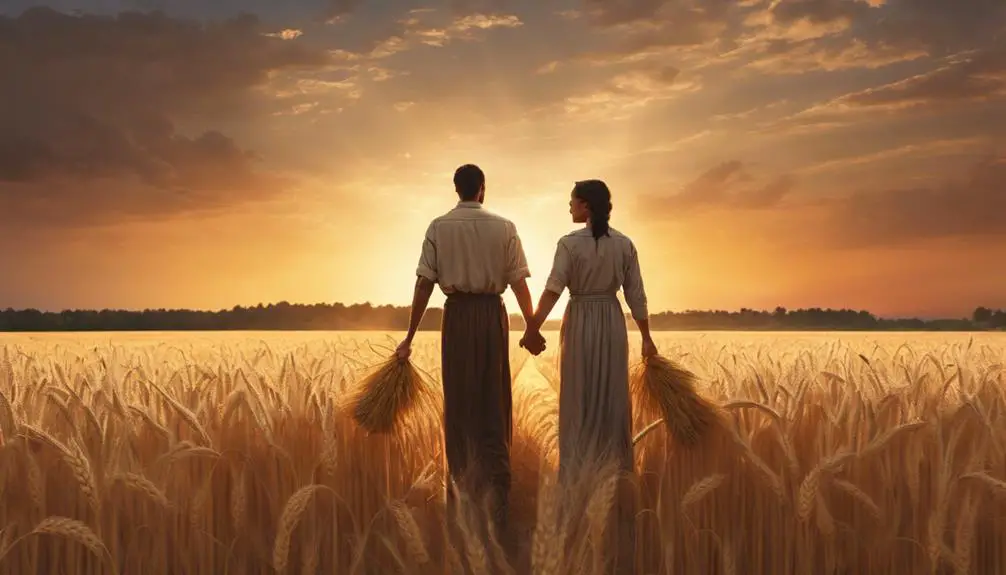Gain insights into the romantic and spiritual journeys of biblical couples, and discover how their stories can illuminate your path to love.

Biblical Couples in the Bible
Imagine standing amidst the lush gardens of Eden, witnessing the first couple, Adam and Eve, lay the foundation for human relationships. You've heard their stories, but have you considered the depth of love, trials, and redemption that each biblical couple embodies?
From Abraham and Sarah's journey of faith to the persistent love of Jacob for Rachel, these narratives offer more than historical accounts; they provide timeless lessons on relationships and faith. As you explore further, you'll uncover the complexities and the profound impact these couples have on our understanding of love, loyalty, and forgiveness.
Why stop now when there's so much more to uncover?
Key Takeaways
- Biblical couples demonstrate the complexities of love, faith, and redemption in various contexts.
- Their stories underline the importance of loyalty, sacrifice, and divine intervention in relationships.
- Lessons from these couples influence moral and ethical behaviors across generations.
- Themes of promise, forgiveness, and the impact of choices are central to understanding their significance in biblical narratives.
Adam and Eve: Beginnings

Adam and Eve's narrative, as the inaugural couple in the Bible, sets a foundational premise for understanding human origins, relationships, and moral complexities. Their story, deeply rooted in the Garden of Eden, isn't just a tale of the first humans but also introduces the concept of original sin, a foundational element in Christian theology. This concept emerges from their act of disobedience against God's command, illustrating the inherent human tendency towards wrongdoing and the consequences that follow.
Within the lush confines of the Garden of Eden, you're presented with a setting that's both literal and symbolic. It's a paradise where needs are met without toil, and yet, it's also the backdrop for a pivotal moral test. The decision to eat from the Tree of Knowledge of Good and Evil, despite divine prohibition, marks a significant turning point. It's this act that introduces original sin into the world, setting the stage for the complex relationship between humanity and divinity.
Analyzing their narrative, you find that it's not just about the fall but also about the introduction of moral responsibility. The repercussions of their actions underscore a critical lesson: actions have consequences, and disobedience carries a price. This moment in the Garden of Eden encapsulates a profound truth about human nature and its capacity for both obedience and defiance.
In essence, Adam and Eve's story offers rich insights into the human condition. It challenges you to ponder the complexities of moral choice, the nature of temptation, and the ever-present possibility of redemption. Through their narrative, you're invited to reflect on the fundamental aspects of human existence: choice, consequence, and the quest for understanding.
Abraham and Sarah: Faith Tested

In the narrative of Abraham and Sarah, faith becomes the crucible through which their devotion and obedience to divine commands are profoundly tested. You witness how the promise of a son, despite Sarah's barrenness, challenges their trust in the divine. This couple's journey is emblematic of faith's complexity, where belief in the unseen must often confront the stark realities of human doubt and physical limitations.
The promise of a son, a central theme in their story, isn't merely a fulfillment of personal desire but a testament to the power of faith in overcoming barriers. The barrenness of Sarah, which in their cultural context could be seen as a mark of divine disfavor, becomes the backdrop against which the miracle of Isaac's birth shines forth. This pivotal event underscores a key motif in biblical narratives: the idea that faith can lead to the overcoming of seemingly insurmountable obstacles.
Your analysis of this couple's story reveals the nuanced ways in which faith is tested. It's not simply about believing in the possibility of miracles but about enduring the wait, the silence, and the apparent absence of fulfillment. Abraham and Sarah's experience teaches you that faith might require you to confront your deepest doubts and still choose to trust in promises yet unseen.
Moreover, their story is a profound reflection on the nature of divine promises. It illustrates that the fulfillment of such promises often comes in unexpected ways and requires a steadfastness that's willing to be tested, refined, and ultimately strengthened. Through Abraham and Sarah, you learn that faith's true test is in its endurance, its capacity to hold on to hope despite evidence to the contrary, and its power to see barrenness overcome.
Isaac and Rebekah: Love Arranged

Exploring the narrative of Isaac and Rebekah, you encounter a love not kindled by chance encounters but arranged through divine intervention and familial obedience. This story, deeply embedded within the cultural norms of its time, offers a fascinating glimpse into the complexities of arranged marriages in the biblical era, underpinned by faith and trust in divine will.
- Divine Intervention at Play: At the heart of Isaac and Rebekah's union is the unmistakable hand of divine intervention. Abraham, Isaac's father, entrusts his servant with the crucial task of finding a wife for Isaac, emphasizing that an angel would guide him in this mission. This divine guidance leads the servant to Rebekah, marking the beginning of their predestined journey together. The reliance on spiritual guidance reflects a profound faith in divine will to orchestrate marital unions, a theme recurring throughout biblical narratives.
- Cultural Norms and Familial Loyalty: The arrangement of Isaac and Rebekah's marriage is deeply rooted in the cultural norms of their society. Marriages were often arranged by families, aiming to strengthen alliances and ensure continuity of lineage and faith. Rebekah's consent, coupled with her family's blessing, underscores the importance of mutual agreement and the role of families in such unions, balancing personal choice with cultural expectations.
- Immediate Acceptance and Love: Upon meeting, Isaac and Rebekah's acceptance of each other demonstrates the potential for love and companionship within arranged marriages. Isaac's love for Rebekah grows, illustrating how respect and affection can flourish even in relationships born out of obedience and arrangement rather than personal choice.
In analyzing Isaac and Rebekah's story, you're reminded of the intricate interplay between divine intervention, cultural norms, and the human capacity for love and acceptance in the face of predestined paths.
Jacob and Rachel: Persistent Love

Shifting focus to Jacob and Rachel, their narrative unfolds a tale of persistent love that endures trials and tests of time and faith. Your exploration into their story isn't just a journey through a romantic saga but a deep dive into the complexities of dream pursuit within the confines of challenging family dynamics. Jacob's unwavering commitment to Rachel, despite the deception by her father Laban, which resulted in Jacob marrying Leah, Rachel's sister, first, exemplifies a profound dedication not only to his love for Rachel but also to his larger aspirations.
Analyzing this narrative, you'll find that Jacob's willingness to work an additional seven years for Rachel, after the initial seven for Leah, underscores a resilience and steadfast pursuit of his dreams, a testament to the power of love and determination. This aspect of their story offers a rich tapestry for understanding the interplay between personal ambition and relational fidelity within ancient contexts, resonating strongly with themes of sacrifice and delayed gratification.
Moreover, the family dynamics at play, including sibling rivalry and parental manipulation, provide a nuanced framework for examining the impacts of familial relationships on personal development and dream pursuit. Jacob's navigation through these dynamics, fueled by his love for Rachel, paints a vivid picture of the complexities involved in balancing personal desires with familial obligations.
In dissecting Jacob and Rachel's narrative, you're not merely recounting a historical romance but are engaging with a multidimensional study of how love, when intertwined with ambition and family, can drive individuals to extraordinary lengths. Their story isn't just one of persistent love but a profound exploration of the human condition and the intricate dance between personal dreams and the realities of familial bonds.
Boaz and Ruth: Unwavering Loyalty

While the story of Jacob and Rachel showcases the power of persistent love, the narrative of Boaz and Ruth exemplifies unwavering loyalty, revealing its profound impact on personal destiny and societal norms. The tale, deeply rooted in cultural context, unfolds in a period of the Judges, a time marked by social and moral upheaval. Yet, it's within this backdrop that Ruth's steadfast loyalty to Naomi, her mother-in-law, shines brightly, offering a beacon of hope and integrity.
The journey of Ruth and Boaz is rich in harvest symbolism, an element that transcends mere agricultural significance to embody themes of providence, renewal, and redemption. Their story, while ancient, speaks volumes about the virtues of loyalty, kindness, and the power of individual actions to transcend societal barriers. Here are three key aspects to consider:
- Cultural Context: Ruth, a Moabite, breaks cultural boundaries by her loyalty to Naomi, an Israelite. This act not only challenges the norms of her time but also sets the stage for her future lineage to have a significant impact on Israel's history.
- Harvest Symbolism: The harvest fields where Ruth gleans not only provide sustenance but also symbolize the blossoming of new beginnings and the reaping of what one sows, both literally and figuratively.
- Unwavering Loyalty: Ruth's decision to stay with Naomi, saying 'where you go, I'll go,' exemplifies a loyalty that defies personal loss and uncertainty, highlighting the transformative power of unwavering commitment.
Analyzing the narrative of Boaz and Ruth, it's clear that their story is a testament to the enduring strength of loyalty and its capacity to influence destiny and challenge societal norms.
David and Bathsheba: Redemption

ARTICLE TITLE: Biblical Couples
PREVIOUS SUBTOPIC: 'Boaz and Ruth: Unwavering Loyalty'
CURRENT SUBTOPIC: 'David and Bathsheba: Redemption'
The story of David and Bathsheba, fraught with moral complexities, ultimately unfolds a narrative of redemption that challenges and refines your understanding of forgiveness and restoration within a biblical context. This tale, emblematic of leadership flaws and human frailty, offers profound insights into the transformative power of repentance and divine grace.
Aspect |
David |
Bathsheba |
|---|---|---|
Moral Complexities |
Adultery, Murder |
Complicity, Victimhood |
Leadership Flaws |
Abuse of Power |
Subjection |
Path to Redemption |
Repentance, Consequences |
Endurance, Resilience |
Restoration Achieved |
Renewed Relationship with God |
Integral Role in Davidic Lineage |
Analyzing David's journey, you recognize a man ensnared by his desires, leading to grievous sins. Yet, it's his confrontation with these sins, prompted by the prophet Nathan, and his genuine repentance that mark the beginning of his redemption. This story doesn't shy away from the consequences of his actions, emphasizing that forgiveness doesn't erase temporal repercussions but facilitates a spiritual renewal.
Bathsheba's narrative is equally complex. Initially a silent figure in the shadow of David's actions, her resilience and eventual prominence as the mother of Solomon highlight a nuanced form of redemption. Her story underscores the capacity for restoration and honor in the aftermath of personal tragedy and exploitation.
Through David and Bathsheba, you're reminded that redemption is intricate, often messy, but always available. Their story, punctuated by moral failings and divine forgiveness, serves as a compelling testament to the power of repentance and the depth of God's grace.
Frequently Asked Questions
How Did Cultural Norms and Traditions of Their Time Influence the Dynamics of These Biblical Couples' Relationships, Beyond What Is Directly Mentioned in the Bible?
You're exploring how external cultural norms and traditions shaped relationships, delving beyond the text.
Gender roles and marital laws of the time heavily influenced dynamics, dictating behavior and expectations. These roles weren't just societal norms but were entrenched in legal systems, affecting everything from inheritance to daily interactions.
Analyzing these elements provides insight into the complexity of relationships, revealing layers not immediately apparent in the narratives themselves.
In What Ways Have Modern Interpretations and Teachings About These Couples Differed From Historical Understandings, and What Has Influenced These Changes?
You've noticed something's shifting in the stories you've always known. Modern interpretations of these narratives now reflect evolving gender roles and a dynamic interpretative evolution.
This isn't just a change in storytelling; it's a reflection of societal shifts and a deeper understanding of historical contexts. Scholars and theologians alike are peeling back layers, revealing how what was once taken at face value is rich with complexity and contemporary relevance.
Are There Any Archaeological Findings or Historical Documents Outside of the Bible That Provide Additional Insights Into the Lives of These Couples or the Periods in Which They Lived?
You're wondering if there's any non-Biblical evidence about these historical figures, right?
Well, archaeological methodologies and documentary analysis have indeed shed light on their times. Through excavations and scrutinizing ancient texts, researchers have pieced together a broader context.
These methods don't directly mention the couples but offer insights into the social, economic, and cultural landscapes they inhabited.
It's a meticulous process, blending science with history to fill in the gaps.
How Have These Biblical Couples Been Represented in Art, Literature, and Media Throughout History, and What Impact Has This Had on Societal Perceptions of Love, Marriage, and Faith?
Throughout history, artistic symbolism and media stereotypes have shaped your understanding of love, marriage, and faith.
Take, for example, representations of Romeo and Juliet. Their story, deeply embedded in literature and art, mirrors some biblical narratives, influencing societal norms about romantic love.
This analysis reveals how these depictions, through various artistic and media lenses, have profoundly impacted your perceptions, often romanticizing or idealizing relationships and setting standards for personal and communal faith practices.
What Role Do These Couples Play in the Religious Practices and Traditions of Judaism, Christianity, and Islam, and How Do Different Religious Denominations Interpret Their Stories?
You'll find that ceremonial practices within Judaism, Christianity, and Islam often draw inspiration from these narratives, weaving them into rituals and teachings.
Interfaith interpretations, however, can vary widely, reflecting the diverse theological landscapes of these religions.
For example, the way a story is told and its role in rituals can differ significantly between denominations, influencing followers' views on love, marriage, and faith in nuanced, complex ways.
Conclusion
In the tapestry of biblical narratives, these couples symbolize the multifaceted dimensions of human relationships, echoing through time. Like trees in a vast forest, each pair stands, rooted in trials, yet reaching towards redemption.
Their stories weave a complex allegory of love's endurance, faith's resilience, and grace's transformative power. Analyzing these unions reveals a scholarly mosaic, detailed in its examination of the human condition, challenging us to see beyond the surface to the divine interplay of flaws and forgiveness.



Sign up